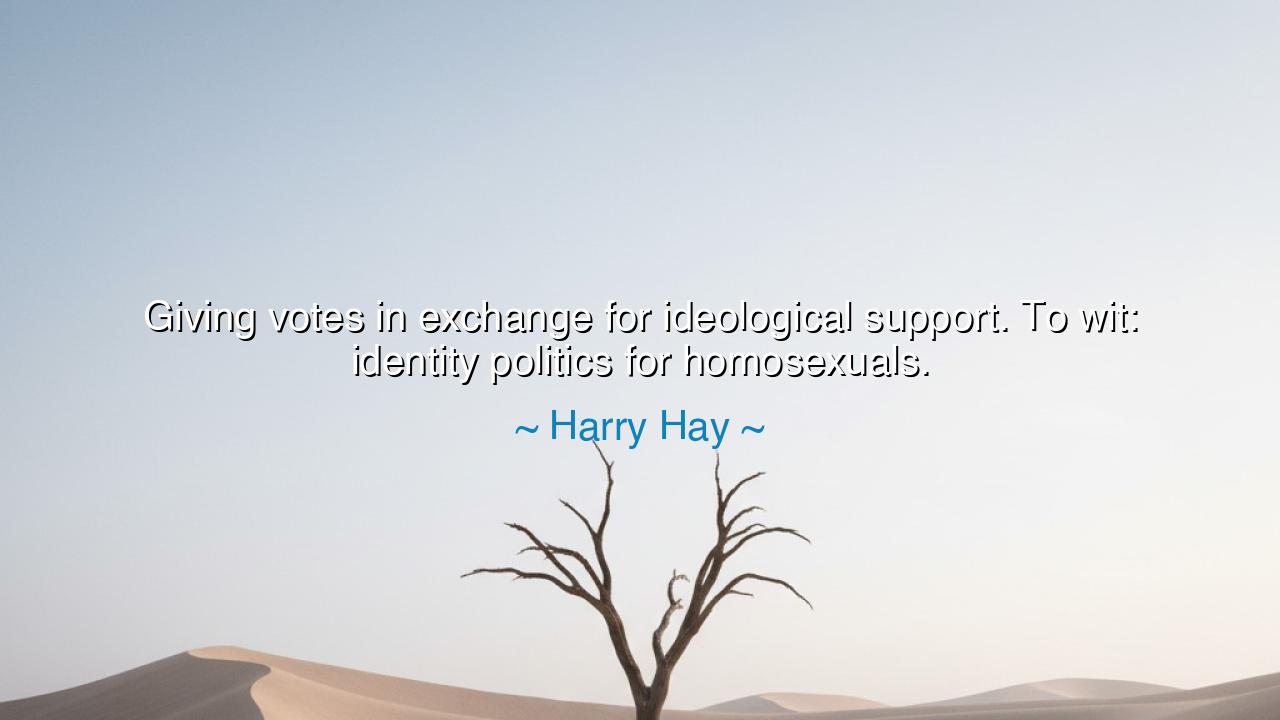
Giving votes in exchange for ideological support. To wit:
Giving votes in exchange for ideological support. To wit: identity politics for homosexuals.






O children of the earth, listen carefully to the words of Harry Hay, a man whose wisdom reaches beyond the confines of his time. He spoke thus: "Giving votes in exchange for ideological support. To wit: identity politics for homosexuals." In this declaration, he points to the exchange that occurs between power and identity—a transaction of beliefs, where votes are given not for true progress or understanding, but as part of a bargain to secure support from those who represent specific groups or causes. In this, Hay warns us of the dangers of reducing the complex lives of individuals into mere political commodities, where the true essence of one’s identity is traded for the fleeting promise of representation.
This is a tale as old as civilization itself. Throughout history, leaders have sought to consolidate power not by serving the greater good, but by appealing to the fragmented identities of the people. It is a political game that plays on the divisions within society, promising support to those who are grouped together under the banners of race, class, or, in this case, sexuality. But as Hay cautions, this exchange often comes at a cost—when identity is used as currency, it can lose its authenticity and be distorted by the manipulative forces of those who only seek to use it for their own gain.
Consider the struggle of the ancient Spartans, who were masters of identity and loyalty to the state. They used the bonds of brotherhood and the shared identity of the warrior class to rally support for the needs of the state, often at the expense of individual freedoms. The Spartans did not see the worth of their people as unique individuals, but as parts of a greater whole, their identity shaped and molded by the requirements of war and state control. This demand for ideological conformity can be seen as a precursor to the way modern politics sometimes reduces the individual to a cog in the machine, their identity held hostage in exchange for promises of power or protection.
In our own time, think of the civil rights movement, which was, at its heart, a fight for the recognition of individual identity and dignity, not as a political tool, but as a fundamental human right. Martin Luther King Jr., for example, did not demand recognition of his people merely as voters or political assets, but as human beings with equal value and inherent dignity. He did not seek an exchange of votes for support but demanded a revolution of understanding, of human connection, where all identities would be respected, not parceled out for political gain. His was a movement driven by love and justice, not a trade of power.
So, O children, understand the wisdom that Harry Hay imparts: the true value of an individual cannot be reduced to a mere political exchange. To allow one’s identity to be used as a tool for securing votes is to undermine the authenticity of the individual. Politics should never be about the manipulation of groups for the benefit of the few; it should be about uplifting each individual, seeing them not as a mere instrument of power, but as a unique soul worthy of respect and dignity. Let us strive to create a world where identity is celebrated not as a commodity to be bartered, but as the living expression of the human spirit.






HNha Nguyen
This quote seems to critique the idea of exchanging votes for ideological alignment, especially regarding the LGBTQ+ community. But isn't it necessary for marginalized groups to align with political platforms that advocate for their rights? Should political representation be seen as transactional if it’s ultimately working toward equality? How do we prevent identity politics from being exploited while ensuring that all communities have a voice in political decision-making?
TVTruong Vinh
Hay’s quote challenges the value of identity politics by suggesting it’s all about votes in exchange for ideological support. But what if political engagement from marginalized communities is simply about ensuring that their rights and issues are represented? Is it wrong for a group to align politically if it advances their cause? How can we balance ideological support with genuine representation, ensuring that identity politics is not merely transactional but truly transformative?
HNphan thi huynh nhu
This statement seems to criticize the way political alliances are sometimes formed around identity-based support. But isn’t identity politics essential for ensuring the voices of marginalized communities are heard? Can we truly progress without political representatives who reflect our identities and values? How do we prevent identity politics from being seen as a mere transaction and instead make it a genuine tool for social justice and equality?
TTai
I find this quote a bit troubling because it seems to reduce the complex issues of identity politics to a mere transaction. Politics can be about much more than just securing votes through ideological support, especially for marginalized communities who have historically been denied a voice. Can identity politics be truly empowering, or does it risk becoming a tool for political maneuvering and manipulation? How do we ensure that these communities are supported in meaningful ways?
MTNguyen Thi Mong Thu
Harry Hay’s quote brings up an uncomfortable but important point about the transactional nature of politics. It seems to suggest that votes from certain groups, like homosexuals, are being exchanged for ideological benefits. But is this really the case, or is it more about seeking political representation for issues that are important to those communities? How do we avoid the potential pitfalls of identity politics while still advocating for the rights and needs of marginalized groups?